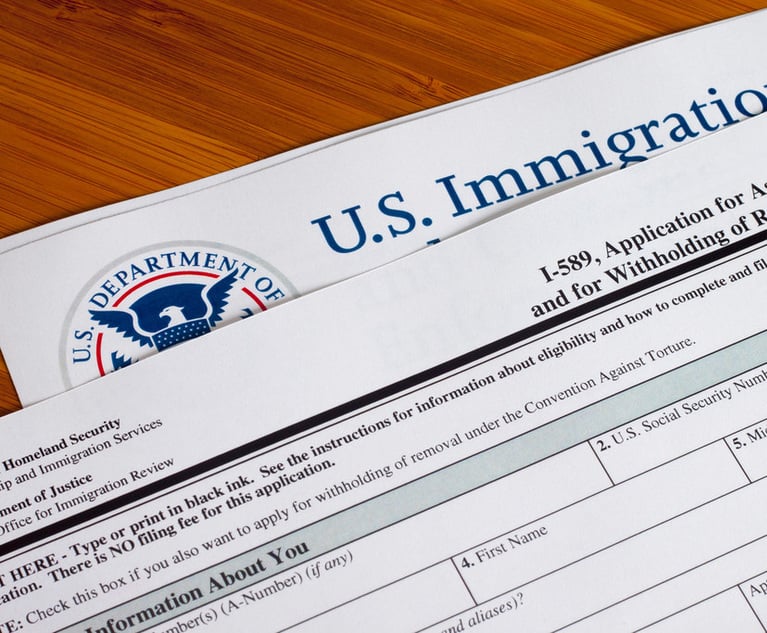Connecticut Supreme Court to Hear 10 Cases in December
The Connecticut Supreme Court is set to hear oral arguments in 10 cases beginning in mid-December. Those cases run the gamut from criminal to First Amendment issues to medical malpractice.
November 15, 2019 at 02:03 PM
4 minute read
 Connecticut Supreme court building in Hartford. Photo: Natalya Bratslavsky/Shutterstock.com
Connecticut Supreme court building in Hartford. Photo: Natalya Bratslavsky/Shutterstock.com
The Connecticut Supreme Court is set to hear oral arguments in 10 cases during its fourth session for 2019-20, which begins Dec. 12.
Here's a look at some of them:
State v. Dulos
The Connecticut Supreme Court is set to hear oral arguments Dec. 12 on the Jennifer Dulos murder case, which has received state and nationwide publicity ever since the 51-year-old mother of five went missing in May. Her husband, Fotis, has been a prime suspect in her disappearance. The couple was going through a divorce at the time of Jennifer Dulos' disappearance.
At issue before the state's high court is whether the trial court properly entered a gag order barring defendant Fotis Dulos, attorneys, witnesses and law enforcement from making public statements in the case, and whether those statements pose a substantial likelihood of material prejudice to the case.
The case has also centered on First Amendment rights, and raised questions about what constitutes protected speech in a criminal proceeding. Justices are now set to weigh whether that gag order violates Fotis Dulos' Sixth Amendment right to a fair trial, and his free speech rights under federal and state constitutions.
The state filed a motion for a gag order that would apply to counsel for both sides, according to the Supreme Court's synopsis of the case. The motion followed statements by defense counsel regarding the wife's disappearance and leaks from law enforcement sources, according to court documents. The trial court granted the state's request, and then went farther by ruling the gag order would apply to witnesses and law enforcement.
The trial court acknowledged that the gag order could affect the First Amendment rights of the affected parties, according to the Supreme Court synopsis of the case. But it found those rights had to be balanced with the defendant's Sixth Amendment right to a fair trial, which media coverage could compromise.
Norm Pattis, the defense's lead counsel, appealed the trial court's ruling. Pattis has spoken frequently to the press about the case.
Karagozian v. USV Optical
In litigation that centers on what constitutes an intolerable work atmosphere, the Connecticut Supreme Court will hear oral arguments in the case of Ohan Karagozian, who was constructively discharged from his employment as a licensed optician manager.
Karagozian, according to the Supreme Court's synopsis of the case, alleged that from the date of his hiring to the date in which he resigned, the defendant—who operated inside a JCPenney Department store—required him to provide optometric services to the doctor in the store, in violation of state policy.
Karagozian's suit alleged he was forced to resign when he asked to stop, and that USV Optical created an intolerable work atmosphere.
The Connecticut Appellate Court affirmed a lower court ruling, which determined Karagozian failed to state a claim of constructive discharge.
Now, the state's high court will determine whether an action for constructive discharge in violation of public policy requires the plaintiff to allege and prove not only that employer intended to create an intolerable work atmosphere, but also that the employer intended to force the plaintiff to resign.
Geralynn Boone, executrix of the estate of Mary Boone v. Boehringer Ingelheim Pharmaceuticals
Plaintiff Geralynn Boone brought a products liability lawsuit against Connecticut-based Boehringer Ingelheim Pharmaceutical on behalf of her mother, Mary, who died of intestinal bleeding.The case hinges on whether one of the country's largest pharmaceutical companies failed to warn doctors of the risks of a prescription blood thinner.
Geralynn Boone links her mother's death to Pradaxa, and claims the company failed to warn medical personnel about the risks in prescribing the drug, according to the Connecticut Supreme Court's synopsis of the case. The lawsuit alleges her mother took Pradaxa to lower her risk of stroke from atrial fibrillation.
Boone claims, among other things, that the trial court improperly precluded the plaintiff from seeking to rebut the testimony of the company's expert witness, who had said that Boone's bleeding did not cause her death.
Read more:
19 Cases Slated for Connecticut Supreme Court Session in November
This content has been archived. It is available through our partners, LexisNexis® and Bloomberg Law.
To view this content, please continue to their sites.
Not a Lexis Subscriber?
Subscribe Now
Not a Bloomberg Law Subscriber?
Subscribe Now
NOT FOR REPRINT
© 2025 ALM Global, LLC, All Rights Reserved. Request academic re-use from www.copyright.com. All other uses, submit a request to [email protected]. For more information visit Asset & Logo Licensing.
You Might Like
View All

Trump Administration Faces Legal Challenge Over EO Impacting Federal Workers
3 minute read
Settlement Allows Spouses of U.S. Citizens to Reopen Removal Proceedings
4 minute read
Law Firms Mentioned
Trending Stories
- 1Uber Files RICO Suit Against Plaintiff-Side Firms Alleging Fraudulent Injury Claims
- 2The Law Firm Disrupted: Scrutinizing the Elephant More Than the Mouse
- 3Inherent Diminished Value Damages Unavailable to 3rd-Party Claimants, Court Says
- 4Pa. Defense Firm Sued by Client Over Ex-Eagles Player's $43.5M Med Mal Win
- 5Losses Mount at Morris Manning, but Departing Ex-Chair Stays Bullish About His Old Firm's Future
Who Got The Work
J. Brugh Lower of Gibbons has entered an appearance for industrial equipment supplier Devco Corporation in a pending trademark infringement lawsuit. The suit, accusing the defendant of selling knock-off Graco products, was filed Dec. 18 in New Jersey District Court by Rivkin Radler on behalf of Graco Inc. and Graco Minnesota. The case, assigned to U.S. District Judge Zahid N. Quraishi, is 3:24-cv-11294, Graco Inc. et al v. Devco Corporation.
Who Got The Work
Rebecca Maller-Stein and Kent A. Yalowitz of Arnold & Porter Kaye Scholer have entered their appearances for Hanaco Venture Capital and its executives, Lior Prosor and David Frankel, in a pending securities lawsuit. The action, filed on Dec. 24 in New York Southern District Court by Zell, Aron & Co. on behalf of Goldeneye Advisors, accuses the defendants of negligently and fraudulently managing the plaintiff's $1 million investment. The case, assigned to U.S. District Judge Vernon S. Broderick, is 1:24-cv-09918, Goldeneye Advisors, LLC v. Hanaco Venture Capital, Ltd. et al.
Who Got The Work
Attorneys from A&O Shearman has stepped in as defense counsel for Toronto-Dominion Bank and other defendants in a pending securities class action. The suit, filed Dec. 11 in New York Southern District Court by Bleichmar Fonti & Auld, accuses the defendants of concealing the bank's 'pervasive' deficiencies in regards to its compliance with the Bank Secrecy Act and the quality of its anti-money laundering controls. The case, assigned to U.S. District Judge Arun Subramanian, is 1:24-cv-09445, Gonzalez v. The Toronto-Dominion Bank et al.
Who Got The Work
Crown Castle International, a Pennsylvania company providing shared communications infrastructure, has turned to Luke D. Wolf of Gordon Rees Scully Mansukhani to fend off a pending breach-of-contract lawsuit. The court action, filed Nov. 25 in Michigan Eastern District Court by Hooper Hathaway PC on behalf of The Town Residences LLC, accuses Crown Castle of failing to transfer approximately $30,000 in utility payments from T-Mobile in breach of a roof-top lease and assignment agreement. The case, assigned to U.S. District Judge Susan K. Declercq, is 2:24-cv-13131, The Town Residences LLC v. T-Mobile US, Inc. et al.
Who Got The Work
Wilfred P. Coronato and Daniel M. Schwartz of McCarter & English have stepped in as defense counsel to Electrolux Home Products Inc. in a pending product liability lawsuit. The court action, filed Nov. 26 in New York Eastern District Court by Poulos Lopiccolo PC and Nagel Rice LLP on behalf of David Stern, alleges that the defendant's refrigerators’ drawers and shelving repeatedly break and fall apart within months after purchase. The case, assigned to U.S. District Judge Joan M. Azrack, is 2:24-cv-08204, Stern v. Electrolux Home Products, Inc.
Featured Firms
Law Offices of Gary Martin Hays & Associates, P.C.
(470) 294-1674
Law Offices of Mark E. Salomone
(857) 444-6468
Smith & Hassler
(713) 739-1250










